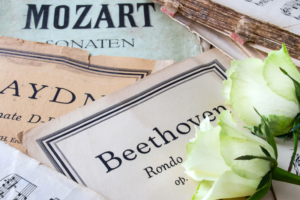Whatever we see, hear, taste and feel affects our thoughts, emotions, and actions. One way you can improve your physiological state is by choosing to listen to the right sounds.
We respond to music on a neurological level. It affects our behavior, psychology and perception of reality.
“Who writes the nation’s songs shapes the nation’s souls.”
-Abraham Lincoln
Johann Sebastian Bach (1685-1750) was a German composer from the Baroque era. As with any artist, Bach’s music reflects his world. During this time, science and religion were still compatible. God wasn’t dead yet, and life was still incapable of logical explanation.
Baroque composers and philosophers believed that music, mathematics and science possessed cosmic relationships, which is why these artists were searching for ways to convey “maraviglia.” (wonder or astonishment)
I think few people understood this better than Glenn Gould.
Baroque artists expressed this wonder by embodying our “God-like” characteristics of purity, strength, and creativity, while ignoring the animal urges.
“The final aim and reason of all music is nothing other than the glorification of God and the refreshment of the spirit.”
― Johann Sebastian Bach
Listening to baroque music is also great for neurological health.
In a Stanford study, it was shown that listening to Baroque music allows the brain to sharpen its ability to anticipate events.
The complicated musical patterns exercise your brain by forcing it to subconsciously track the ongoing development of a piece and form predictions about what will come next.
Baroque music also induces alpha waves. When we go to bed and drift off to sleep we go first into alpha. This is the state when we’re sort of aware but not fully conscious. When we lose ourselves in a book or a film so that we are unaware of what’s going on around us we often also have alpha waves. We enter a state of ‘flow,’ and lose the sense of time.
This flow-like state allows us to bypass the conscious mind and more easily implant ideas and information into our subconscious mind, which explains why we retain information better when listening to Baroque music.
Studies have also been done in classrooms showing that Baroque music has a calming effect and enables children to concentrate on their lesson far better.
This may be because the rhythm is around 60 beats per minute, similar to a resting heart-rate.



